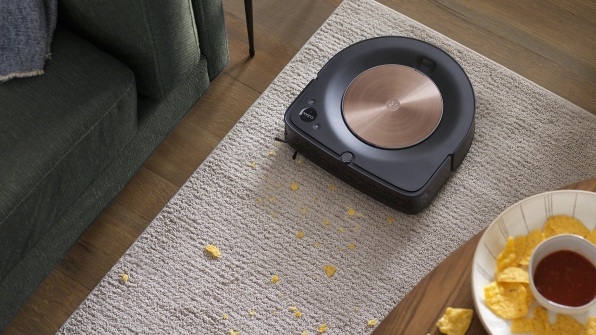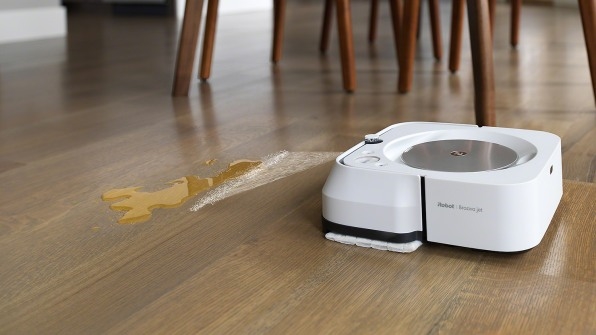A new ‘brain swap’ makes iRobot’s Roomba vacuum way smarter
After nearly two decades of selling Roombas, iRobot is looking beyond hardware to stand out from its rivals.
Although the company will keep making robot vacuums—it has 87% market share in the United States, and 67% outside China—its strategy is becoming more about software and services than superior hardware. That shift starts today with an overhaul for the iRobot Home app and a related suite of new cleaning features that the company is calling “iRobot Genius.”
iRobot Genius is free to iRobot users. But Colin Angle, iRobot’s founder and CEO, says that the goal is to make its Roomba vacuums and Braava mops smarter over time, and he hints that the “brain swap” will eventually support new subscription-based businesses.
“A robot isn’t a tool like a hammer. It’s a partner,” Angle says. “And so by being a better partner, we believe we can have a long-term trusted relationship with the customer, which makes what we do feel more like a service.”

Less autonomy, more precision
At launch, iRobot Genius consists of six new features:
The common thread with all of these features is iRobot’s realization that smart home robots shouldn’t really be fully autonomous. Instead, they should be more precise about doing what their owners want them to do. “By giving more precise control to the user, the robot can actually be a better partner and clean kind of how you do,” explains Angle.
Being able to clean only under the kitchen table, for instance, means not having to clear everyone out of the room or listen to the vacuum for an hour. Smarter scheduling and detection of trouble spots means users will be less likely to get frustrated and turn their Roombas off. (Angle says this happens about a third of the time and is “a failure of robot intelligence” when it does.)
iRobot also plans to launch more cleaning features through future software updates. Angle refers to today’s launch as “iRobot Genius 1.0,” with versions 2.0 and 3.0 to come in 6 and 12 months, respectively.
“We have a long list of new features . . . but all around this common theme of giving you more control of when, where, and how the robot works,” he says.

Beyond the hardware business
Until now, iRobot’s business has revolved around hardware sales, mostly to consumers. While the company used to have a military division with robots for reconnaissance and bomb disposal, it sold that business in 2016 to focus on the smart home.
Hardware alone is a tough business, though, and iRobot has lots of competition from brands such as Neato, Eufy, Ecovacs, and SharkNinja. (iRobot is currently suing the SharkNinja company for patent infringement and successfully litigated Black & Decker out of the robot vacuum business a few years ago.) While iRobot is still the most popular robot vacuum maker, features such as smartphone control, ledge detection, and voice assistant integration are now table stakes with other vendors.
Core cleaning features will always be free, and iRobot is not in the business of selling customers’ data.
That may help explain why iRobot is now talking about service-oriented business models. The company already sells vacuums on monthly payment plans through its website and has been testing a subscription model in Japan that lets users upgrade to new hardware every few years. Expect those plans to expand as iRobot tries to create more direct relationships with customers.
And while Angle won’t get into specifics, he also mentions the potential for more subscription services that aren’t tied to cleaning and hardware sales. A robot that could create temperature or humidity maps of a home, for instance, might be useful for other things beyond cleaning.
“If there was a service that was exciting that was orthogonal to core cleaning, and people were interested in it, maybe that’s something that we would charge you for, because it’s beyond the scope of why you bought the robot,” Angle says.
He stresses, however, that core cleaning features will always be free, and that the company is not in the business of selling customers’ data. iRobot got a round of bad publicity a few years ago when Angle suggested that it might let customers share mapping data with other companies such as Google and Amazon, but he now says the company is “leaning forward on privacy.” Charging for services beyond cleaning would be one way of making sure customers consent to their data being used for other things.
Angle envisions robots that do more than vacuum and clean as well, though iRobot indefinitely postponed plans to release a lawn-mowing robot called Terra earlier this year. Angle says putting off the product allowed it to focus on the cleaning features it’s launching today, but he won’t say for certain whether Terra is coming back. (“No news at this point other than my assertion that robots are supposed to be mowing your lawns,” he says.)
Either way, Angle says that it feels like early days for smart home robots, even 18 years after the first Roomba debuted.
“This is just the beginning,” he says. “This is 1.0. Buying a Roomba now is a little like buying a Tesla in that it gets smarter, and it’s a new robot every few months.”
(24)



